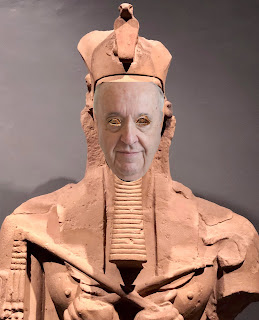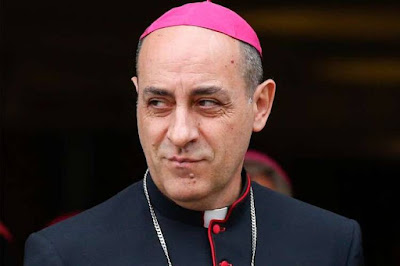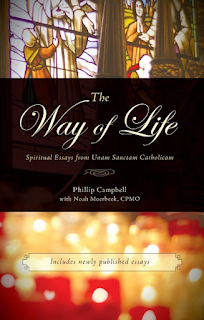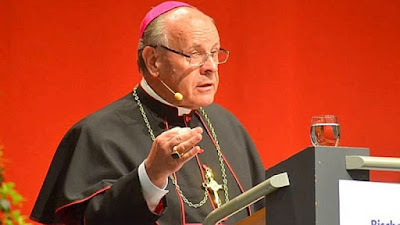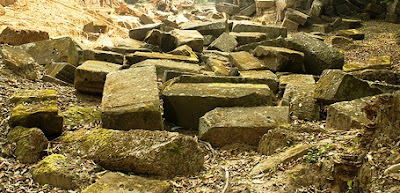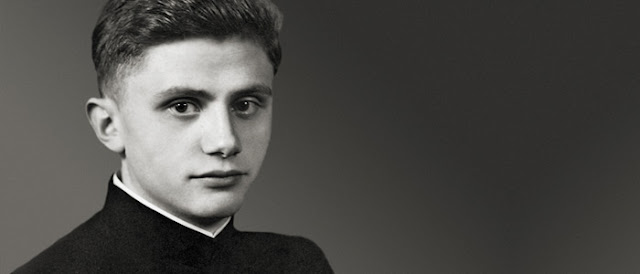Sunday, December 31, 2023
"I Carefully Block My Ears With Wax": Marcel De Corte to Jean Madiran
Thursday, December 28, 2023
Bad Humanae Vitae Parallels
In the wake of scores of bishops rejecting Fiducia Supplicans globally, popesplainers have resorted to comparing Fiducia Supplicans to Humanae Vitae as a way to deflect criticism of the document. The hyperpapalist website Where Peter Is has said that critics of Fiducia Supplicans "need to be reminded of the reception of Humanae Vitae...before asserting that the public reactions to magisterial documents are markers of its "failure.'" Then there is this little gem, which was followed by a piece from the same influencer on all of the similarities between Fiducia Supplicans and Humanae Vitae.
Sunday, December 17, 2023
Six Books I Worked On This Year
Sunday, November 26, 2023
How to Tell Christian Prayer from New Age Meditation
We live in a world which rejects Catholic tradition while simultaneously professing great interest in spiritualities influenced by the New Age. Christians have been traditionally reluctant to embrace such practices, as they contain elements that are fundamentally opposed to the most basic tenets of Christianity. Some, however, have merged various elements of eastern mysticism and New Age neo-paganism with traditional Catholic spirituality, thrown in some Christian vocabulary and are now peddling these practices as compatible with Catholicism. For example, the method of "Centering Prayer" promoted by the late Cistercian monk Basil Pennington is a good example, but there are others. These practices are promoted as Christian forms of "contemplation", and Catholics are encouraged to participate. In this article we will look at how to discern whether a spiritual practice is authentically Catholic or just New Age esoteric mysticism in a Christian veneer. We will use the 'Centering Prayer' spirituality developed by Fr. Thomas Keating and Basil Pennington as an example, but what we will say can be applied to any questionable spirituality.
Thursday, November 23, 2023
In What Sense is the Pope Above Canon Law?
Does this literally mean, however, that the pope can break canon law at will as a normal exercise of his authority? When the pope violates canon law, is this to be understood as a legitimate exercise of his juridical authority?
Sunday, November 12, 2023
"Strict Consistency with the Past"
Whilst casually flipping through my old copy of the 1929 New Catholic Dictionary, I looked up its entry for "Pope" and found an interesting little nugget. After a rather boiler-plate explanation of papal authority (universal, immediate, perpertual, etc.), it addresses the question of whether pontifical power is to be understood in an absolutist manner. After discussing the pope's practical dependence on the curia for his governance, the article answers the question in the negative:
Sunday, November 05, 2023
The Last Gasp of Our Akhenaten
Pope Francis's new motu proprio Ad Theologiam Promovendam has called for a "paradigm shift" in Catholic theology, citing the "profound cultural changes" of the modern world as the justification. The pope insisted on a "courageous cultural revolution" within Catholic thought, calling for our theology to become "fundamentally contextual." Among other things, he called for theology to be primarily "inductive," focused on "dialogue and encounter between different traditions and different knowledge, between different Christian confessions and different religions, openly engaging with everyone." He contrasted this new approach with "abstractly re-proposing formulas and themes from the past," which the pope characterized as "desk bound theology."
Monday, October 16, 2023
A 1971 Proposal for a New Form of First Confession for Children
Sunday, September 24, 2023
Another Older Catechism on Capital Punishment
[Sept. 24, 2023] Back in June of 2019, Dr. Peter Kwasniewski published a piece at Rorate Caeli exploring on how pre-Vatican II catechisms treated the subject of capital punishment. Entitled "What Good is a Changing Catechism?", the article demonstrated a consistent teaching on the liceity of the death penalty going back to Council of Trent at least. I also published an article on the subject ("Pre-Vatican II Catechisms on the Capital Punishment") arguing the same. These collections of pre-Conciliar catechism quotes are important pieces of evidence displaying an indisputable continuity of the Church's teaching across the generations.
Thursday, September 14, 2023
An Injustice from the Beginning
Sunday, September 03, 2023
Book Review: Blosser & Sullivan's Speaking in Tongues: A Critical Historical Examination
Saturday, August 26, 2023
The Church's Historical Blindspot
Sunday, August 13, 2023
On the Superior Merit of the Traditional Mass
Since one of the primary obligations of those in authority in the Church is the glory of God through the salvation of souls, they have the obligation to encourage, and, in some cases, require the ritual of the Mass which is most efficacious.
Thursday, August 10, 2023
Stop Using This Word So Recklessly
Tuesday, August 08, 2023
"The Pope's Authority is Bound to the Tradition"
Saturday, July 29, 2023
The Obedience of St. Padre Pio
Monday, July 17, 2023
Tucho Fernández's "Essentialist" View of Scripture
★ ★ ★ ★ ★
Saturday, July 15, 2023
The Cardinalate's 80-Year Rule—A Critique
Sunday, July 09, 2023
A Template for Great Homilies
[July 9, 2023] I was vacationing this week and attended the diocesan Traditional Latin Mass at St. Anne's in Hamilton, Ontario. The celebrant was Fr. Ian Duffy. I have been to the TLM in Hamilton before, but this was my first experience with Fr. Ian. I am happy to say that Fr. Ian not only delivered a splendid homily, but that it was so solid that it could serve as a template for good homiletical practice in general. I wanted to highlight the four qualities I found so refreshing about Fr. Ian's homily:
Saturday, July 01, 2023
Pius XI, Pope of the Missions
Thursday, June 29, 2023
Anniversarius Sextus Decimus
Over the years, many of you have reached out to me and expressed gratitude in particular for the articles on subjects like spirituality, maintaining faith, and dealing with disappointment or doubt. I am humbled that the reflections posted here have been a source of edification to many.
Sunday, June 25, 2023
Death Penalty: Miscontextualizing Pope Nicholas in Fratelli Tutti
In this essay, I will demonstrate that Pope Francis's 2020 encyclical Fratelli Tutti miscontextualizes a quote from Pope Nicholas I (858-867) on the subject of capital punishment, making it look as if Pope Nicholas affirmed something beyond what he actually did. Our study will take us through a fair amount of history and textual analysis, but it will all serve to make the point clear in the end.
Saturday, June 10, 2023
Post-Conciliar Turmoil Memorialized in Stone
I recently paid a visit to Belmont Abbey in Belmont, North Carolina. Belmont Abbey was founded as a Benedictine monastery back in 1876; there is still a functional Abbey there, though today it is better known as the site of Belmont Abbey College.
Sunday, May 28, 2023
A Pentecost Miscellany
[May 28, 2023] Happy Pentecost brethren! I have had so many things in my mind recently, but as I am sure I will not have time to flesh most of them out, today I am presenting you with a miscellany of my recent ruminations. I may develop these further in future posts, but who knows. Enjoy my brain dump!
Saturday, May 20, 2023
Response to Julian Kwasniewski & Rob Marco on Men's Groups
[May 20, 2023] Earlier this month, Mr. Rob Marco published an article at Crisis called "Why Your Catholic Men's Group Will Eventually Fold." It is an excellent piece that reflects the author's dissastisfaction with Catholic men's groups and speculates on why they seem to be characterized by shallowness, posturing, and ephemerality. Robert Greving wrote a follow up called "Why Your Catholic Men's Group Should Eventually Fold," building on the reflections of Mr. Marco with what I would call a more sociological approach, observing that men's groups reflect the modern tendency to try to programitize and officialize things that are meant to be organic. Both of these articles are thought-provoking and I recommend you read them both, especially before perusing the rest of my piece.
Saturday, May 13, 2023
Newman's Development of Doctrine
Wednesday, May 03, 2023
Losing Our Liturgical Innocence
[May 3, 2023] One of the most formative books in the development of my own thought on Catholic liturgy and tradition was The Heresy of Formlessness by German author Martin Mosebach (Ignatius Press, 2006). Though relatively unknown in America at the time, Mosebach is a well-known voice for Catholic Tradition in the German speaking world. After seventeen years, Heresy of Formlessness remains an illuminating book that puts the liturgical rupture of the past four decades in perspective from the point of view of the layman in the pew.
Saturday, April 29, 2023
Bishop Huonder and the SSPX
[Apr. 29, 2023] The big news this week has been the revelations by Bishop Vitus Huonder, retired Bishop of Chur (Switzerland) that Pope Francis had told him privately that the Society of St. Pius X are not in schism.
Traditional Catholic media sources have been abuzz with essays and podcasts jubilantly framing these revelations as a vindication for the position of the Society and traditional Catholic media, who have consistently maintained that the SSPX is not in a state of schism.
I, on the other hand, believe this to be a nothingburger, for three very important reasons:
Sunday, April 23, 2023
Repetitions of the Sign of the Cross in the Mass
Wednesday, April 19, 2023
Three Types of Scandal
Sunday, April 16, 2023
Statistics on Motu Proprios 1978 - Present
[Apr. 16, 2023] A few days ago I saw an interesting tweet by Matthew Hazell noting that in 2023 alone Pope Francis has already issued 50% more motu proprios than Pope Benedict had throughout his entire pontificate.
Saturday, April 15, 2023
Pius VI and the Synod of Pistoia
The Synod of Pistoia was the last gasp of the Gallican movement, which attempted to detract from the authority of the Holy See by transferring much of the governance of national churches over to their respective governments and synods of local bishops. It asserted radical innovations in Church governance and proposed sweeping reforms that touched on everything from monastic discipline to the sacramental theology to the order of the liturgy. In many places, the acts of Pistoia anticipate the thinking of the theologians of the Nouvelle théologie responsible for the calamities that followed the Second Vatican Council.
Tuesday, April 11, 2023
Are Traditionalists "Rebels of Korah"?
[Apr. 11, 2023] Bad biblical analogies are the bane of modern religious discourse, and those wielded by opponents of traditionalism are among the worst. Case in point is the comparison of trads to the rebels of Korah from the Old Testament Book of Numbers. Numbers 16 tells us that Korah was a Levite and relative of Moses who resisted Moses' authority. Korah and his partisans were smitten by the power of God as punishment for their rebellion; in the New Testament, certain "ungodly persons" who "reject authority" are compared to the rebels of Korah (cf. Jude 1:8, 11).
Sunday, April 09, 2023
Four Reasons for the Resurrection of Jesus
Sunday, April 02, 2023
It Is Not Wrong to Assume Someone Has Gone Straight to Heaven
We are all familiar with the modern spectacle of funerals as immediate canonizations rather than occasions for prayer and penitence for the deceased. Contemporary discomfort with the doctrines of hell and purgatory—and a profound lapse in catechesis on the gravity of sin—has transformed funeral masses into a "celebration of life," in such a way that the bereaved are not enjoined to pray for the dead. Everybody just seems certain that grandma is among the choirs of angels and doesn't give it a second thought.
Sunday, March 12, 2023
Some Nonsense from Cardinal Cupich
[Mar. 12, 2023] Back on February 27, Cardinal Blaise Cupich published an article in America Magazine entitled "Critics of Pope Francis' Latin Mass Restrictions Should Listen to JPII." In this essay the good Cardinal accused traditional Catholics who resist Traditionis custodes of a plethora of faults—ingratitude to the generosity of Benedict XVI and John Paul II, undermining the See of Peter, resistance to the Holy Spirit, and, that most tiresome canard, rejection of the Vatican II. He attempts to tie embrace of the Novus Ordo with acceptance of Vatican II.
Sunday, March 05, 2023
The Church as a Barnacle Encrusted Ship
Sunday, February 26, 2023
"Preserve His Church from Falling Into Error" — The Canonization of St. Bonaventure
I was recently made aware of a fascinating text from the pontificate of Pope Sixtus IV (1471-1484) with import to the infallibility of canonizations. The text in question is the 1482 Superna caelestis, the canonization bull for St. Bonaventure.
Sunday, February 12, 2023
Review: "The Once and Future Roman Rite" by Peter Kwasniewski
[Feb. 12, 2023] When Peter Kwasniewski's The Once and Future Roman Rite was announced (TAN Books, 2022), I was a little confused. Angelico Press had only recently published Reclaiming Our Roman Catholic Birthright (2020), a fantastic apologetic for the Traditional Latin Mass. I wrote a review of Reclaiming Our Roman Catholic Birthright on Unam Sancam Catholicam, describing it thus:
Monday, January 30, 2023
The Pope's Reductive Structuralism
Sunday, January 15, 2023
Let Us Rejoice in 2023
[JAN. 15, 2023] This New Year was quite somber in the Boniface household. The death of Pope Benedict XVI on New Years Eve aside, I was completely wiped out with Covid, an ordeal from which my strength has not yet fully recovered. Personal and ecclesiastical events seemed to portent 2023 as a year of sorrow and penitence. Time will see if this prognostication is correct.
Sunday, January 08, 2023
Farewell Reflections on Benedict XVI
Normally on the New Year I post a list of what I consider the most important Unam Sanctam articles over the past twelve months. However, given the recent passing of Pope Benedict XVI, I thought it fitting to devote my first piece of 2023 to the memory of the late pontiff. This essay will be longer than most, for which I beg your indulgence, but it is difficult to sum up what I think and feel about this man with anything approaching brevity. Therefore, bear with me, I pray, as it is fitting that I should be allowed a bit of pontificating in an article about a pontiff.






